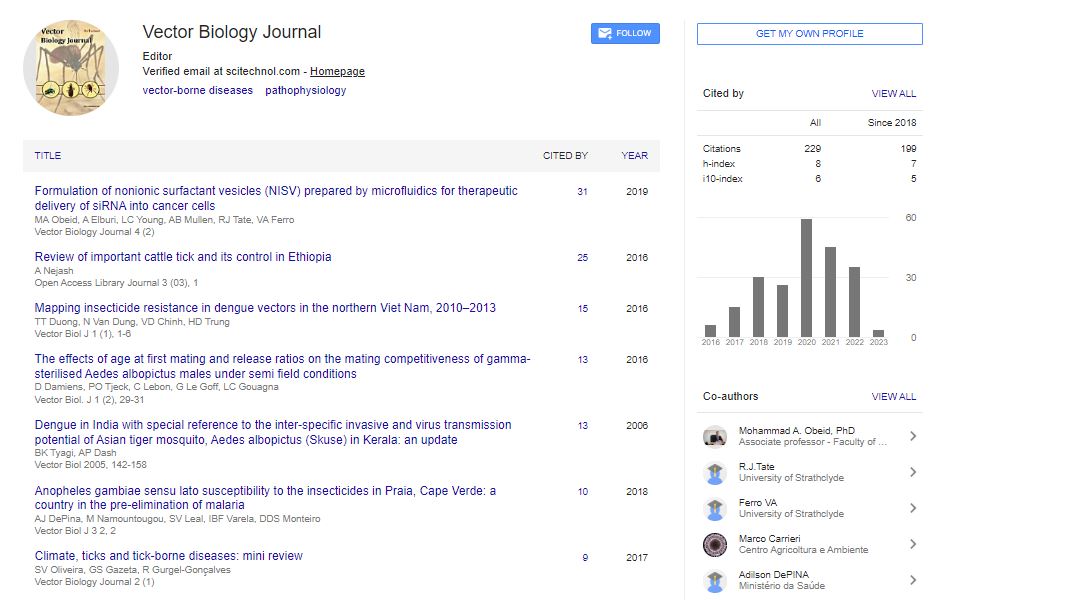Opinion Article, Vector Biol Vol: 8 Issue: 1
Synoptic Overview on West Nile Virus
Himig Kim*
Department of Chemistry, Hong Kong University of Science and Technology, Clear Water Bay, Hong Kong
*Corresponding Author: Himig Kim
Department of Chemistry
Hong Kong University of Science and Technology
Clear Water Bay, Hong Kong
E-mail: Himigkim@123.com
Received date: 20 Febrauary, 2023, Manuscript No. VBJ-23-95803;
Editor assigned date: 22 Febrauary, 2023, PreQC No. VBJ-23-95803(PQ);
Reviewed date: 09 March, 2023, QC No VBJ-23-95803;
Revised date: 16 March, 2023, Manuscript No. VBJ-23-95803(R);
Published date: 23 March, 2023, DOI: 10.4172/2473-4810.1000259.
Citation: Kim H (2023) Synoptic Overview on West Nile Virus. Vector Biol 8:1.
Description
West Nile Virus (WNV) is a viral disease that primarily affects birds but can also be transmitted to humans and other animals through mosquito bites. West Nile Virus is primarily transmitted through the bite of infected mosquitoes. Mosquitoes become infected with the virus when they feed on infected birds, which act as reservoir hosts for the virus. Once infected, mosquitoes can then transmit the virus to humans and animals when they bite and feed on their blood. Apart from mosquito bites, West Nile Virus can also be transmitted through other means. In rare cases, the virus can be transmitted through organ transplantation, blood transfusion, or from mother to baby during pregnancy, childbirth, or breastfeeding. However, these modes of transmission are relatively uncommon compared to mosquito bites.
Symptoms
Most people who are infected with the West Nile Virus do not show any symptoms, and the virus resolves on its own without causing any severe illness. However, about 20% of infected individuals may develop symptoms that range from mild to severe.
Mild symptoms: Mild symptoms of West Nile Virus infection can include fever, headache, body aches, fatigue, and swollen lymph nodes. These symptoms are similar to those of the flu and may last for a few days to several weeks.
Severe symptoms: In rare cases, West Nile Virus infection can progress to a more severe form known as West Nile neuroinvasive disease. This can cause inflammation of the brain and spinal cord, leading to more severe symptoms such as high fever, severe headache, neck stiffness, disorientation, muscle weakness, tremors, convulsions, and paralysis. These severe symptoms may last for several weeks or even months and can sometimes result in long-term neurological effects or death. It is important to note that older adults, people with weakened immune systems, and those with underlying health conditions such as diabetes or hypertension are at a higher risk of developing severe symptoms if infected with the West Nile Virus.
Prevention
Mosquito control: Eliminate standing water in and around home, as mosquitoes breed in stagnant water. This includes removing water from flower pots, bird baths, gutters, and other containers. Keep swimming pools and hot tubs clean and properly maintained. Use mosquito repellents containing N,N-Diethyl-Meta-Toluamide (DEET), picaridin, IR3535, or oil of lemon eucalyptus when spending time outdoors, especially during dusk and dawn when mosquitoes are most active.
Wear protective clothing: When spending time outdoors, wear long-sleeved shirts, long pants, and socks to minimise exposed skin and reduce the risk of mosquito bites.
Stay Indoors: If possible, avoid spending time outdoors during dusk and dawn when mosquitoes are most active and likely to bite.
Treatment
There is no specific antiviral treatment for WNV, and treatment is generally supportive, focusing on managing symptoms and complications.
Symptomatic care: Most people with WNV will experience mild symptoms such as fever, headache, muscle aches, and rash and may not require specific treatment. Over-the-counter medications like acetaminophen or ibuprofen can be used to manage fever and pain. Bed rest and staying hydrated are also important for recovery.
Hospitalisation: Severe cases of WNV can result in meningitis, encephalitis, or other neurological complications. Hospitalisation may be necessary for supportive care, such as intravenous fluids, respiratory support, and close monitoring of vital signs.
Anticonvulsant medications: Seizures can occur in some severe cases of WNV encephalitis, and anticonvulsant medications may be prescribed to manage seizures and prevent further neurological damage.
Pain management: If patients experience severe pain, medications such as opioids or other pain relievers may be used to manage discomfort.
 Spanish
Spanish  Chinese
Chinese  Russian
Russian  German
German  French
French  Japanese
Japanese  Portuguese
Portuguese  Hindi
Hindi 